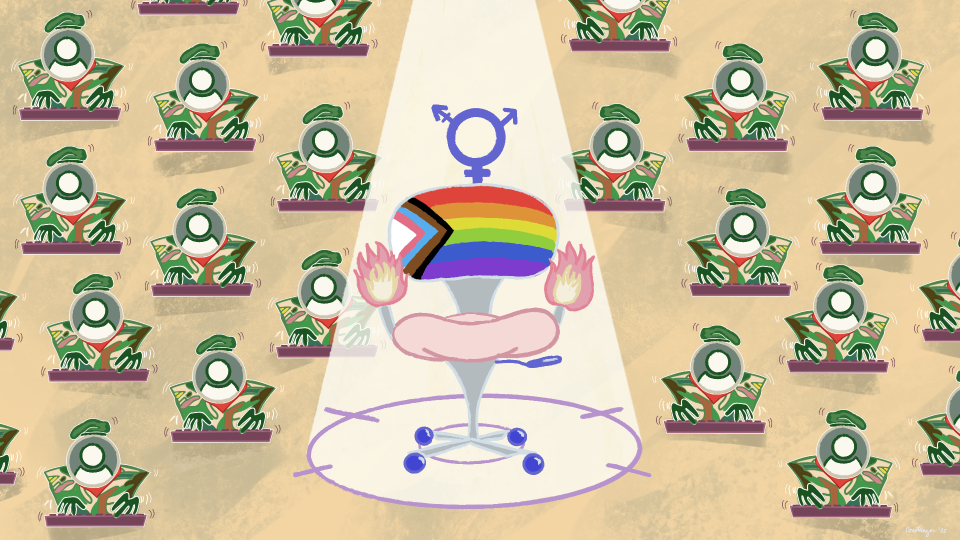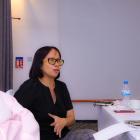
Illustration by Constanza Figueroa for GenderIT.org
Many women and girls in Indonesia use social media extensively to discuss and share knowledge on issues that affect them. While we know that digital space provides a place to communicate, it also has a negative side, especially for vulnerable communities. That's because social media is mostly developed with a male-western perspective, which does not guarantee the safety of its users.
Those two sides of the coin in social media bring into question the term ‘freedom’ in digital space. Lately, it has become the place where hate and misinformation is circulating, by a group of people who have come to be known as as cybertroops. This situation has been portrayed by Masduki in his paper, Cyber-troops, digital attack and media freedom in Indonesia.
He cited that social media was supposed to offer room for citizen voices to be heard, but in contrary it is also used to attack freedom of expression in Indonesia. The article will explore further about how cybertroop operations in Indonesia could get worse, becoming digital stalkers which could endanger online safety, as well as threatening freedom online. Specifically, I write about how cybertroops target vulnerable groups, and have tried to silence their voices with manipulative cyberbullying behind anonymous accounts, and how these kinds of attacks infringe on women's voices.
The inception of Indonesia cybertroops
When there are some cybertroops definitions among researchers, I choose one which is most related to Indonesia. Wija Wijayanto et al on The Infrastructure of Domestic Influence Operations: Cyber Troops and Public Opinion Manipulation Through Social Media in Indonesia stated that cybertroops are a particular type of influence operations which evolved from specific political conditions and practices in Indonesia. They also explained some essential features of cybertroops: secret funding, highly coordinated and involving mostly anonymous accounts.
Their goal is to manipulate social media conversation in certain hot topics, especially using hashtags and trending topics. At the beginning cybertroops were designated for the Indonesia presidential campaign, first Joko Widodo, and then to Prabowo Subianto. The people in the group had different tasks, from monitoring the conversation, creating the hashtags and flooding the discussion into similar comments, in order to create the hype and hashtags.
Their goal is to manipulate social media conversation in certain hot topics, especially using hashtags and trending topics.
Prabowo Subianto had a more extensive social media campaign compared to his predecessor, Jokowi. At this time, the women who run the parliamentarian or the campaign of Prabowo's rival started to receive mixed forms of cyberbullying in their respective social media. The attack is not only hate comments, but also doxxing by displaying sensitive private information on social media in a disrespectful manner. Most of the time, it also transformed into intrusive behaviour in real life. A civic media observatory research had portrayed cyberbullying of female activists and journalists during the 2024 general election in Indonesia. The research was capturing the conversation on social media and to expose the escalation of Technology-facilitated gender-based violence (TFGBV). during and then, after the general election campaign.
When the attack on women keeps getting worse
Given the success of the cyber operation during the general election campaign, the operation was also applied to handle citizen protest against the government and to silence the citizen discussion in some important topics, among vulnerable people. It started when some women shared their opinion and experiences on social media, on how women and the LGBTQIA+ community could be more empowered and have freedom to choose whatever they like for their lives.
When the discussions got more attention, suddenly it was attacked by the cybertroops. They tried to infiltrate the discussion with orchestrated attacks on women's accounts. They suddenly flooded the comment section with many misogynist and mansplaining comments. The orchestrated attackers continuously discredit the ideas and the women who engage in the discussion. When the coordinated harsh comments haven't had a significant effect, they tried to doxx the identity of women and spread it through the internet, with slut-shamming mockery and demeaning to women.
The purpose of these attacks are to expose and label female identities actively involved in social movements as problematic persona (e.g have personal disorder, problem with their families, or have different sexual orientation) stating that those problematic people don’t have any right to organise the movement. Then, they question their mental ability to have such vocal voices on important issue. It was to give the women a bad name. On some occasions, the stalker also targeted women in real life, by sending threats, following them during their daily activities or posting their phone numbers and address and letting the mob send the threats.
As their signature work pattern, the attacker stays anonymous.. Some accounts allegedly steal real people's photos and then use them as camouflage. Observing their way of working, they have shifted from attacks on social media, continue to spread information by doxxing and humiliate the target; it seems that there is possibility the troops also have access to information about the target (the ID, the profession, their history etc). Not everyone has access on those kind of dataset. This means that the troops have been employed by parties who have power and money to get access to certain confidential information.
Given the success of the cyber operation during the general election campaign, the operation was also applied to handle citizen protest against the government and to silence the citizen discussion in some important topics, among vulnerable people.
The damage of gender violence in cyberspace on women
With the coordination and heavy manpower that has been involved in orchestrated cybertroop attacks on vulnerable people, it seems that there is a hidden agenda behind the action. Following the pattern of the attacks previously, I think there are some agendas that want to maintain the status quo on women, and not let the women and LGBTQIA+ movement flourish, nor be vocal in public space. I found a narrative who wants to put women more into the domestic area and keep the patriarchy still alive in Indonesia. The wording like: ”women better stay at home,” “a children will have better upbringing when they stay and grow up with their mother at home,” or "LGBTQIA+ isn’t suitable for Indonesian culture and religions" are just a few comments thrown at the people who initiated and are involved in the movement.
I have found that the threats against women have several consequences. Some decide to hiatus from social media for a while due to massive attacks that they receive. Some of them have to close social media accounts that they are used to be active on, e.g. a woman has to close the Medium account that she had because she got continuous attacks on Medium, that she only used to share personal stories. Other women have decided to leave social media because the threat comes even to their family. This situation is related with research that has been conducted by UN Women, which said that women who have faced stalking and online gender violence mostly distance themselves, or worse, leave social media.
All forms of cyberattacks targeting vulnerable individuals in Indonesia have the potential to hinder progress in promoting and protecting human rights.
Some organisations have raised their voices against the rise of technology-facilitated gender based, calling for more legal action and regulation from the government. The Indonesian Commission on Violence against Women said to fight against any kind of cyberbullying, but many women also take action to fight against it through collective action organised by individuals and communities. They have started to identify the anonymous accounts indicated as cyber troops, monitor the activity and report it to the platform when there are suspicious activities. A joint civil society organisation has urged Indonesia law enforcement to become more proactive when it comes to fight against TFGBV.
All forms of cyberattacks targeting vulnerable individuals in Indonesia have the potential to hinder progress in promoting and protecting human rights. At this time, women and marginalised groups have seen a less active presence in digital spaces compared to their male counterparts. Individuals impacted by this situation may perceive the digital realm as a hostile environment, which could potentially compromise their safety. Instead of leveraging the digital space to foster community and express freedom of speech, they may view it as a threat.
It is essential that we take sustained and collective action over time to investigate this type of violence and prevent women from leaving the internet. It is imperative that we do not allow cyber troops to infringe upon the freedom of expression of women online. It is crucial that we reclaim our voices and document these attacks, this will enable us to develop strategies to persist in this digital space and identify these digital stalkers.
Footnotes
BIBLIOGRAPHY
Masduki, Cyber-troops, digital attack and media freedom in Indonesia
Wija Wijayanto et al, The Infrastructure of Domestic Influence Operations: Cyber Troops and Public Opinion Manipulation Through Social Media in Indonesia
Juliana Harsianti, Cyberbullying hinders women’s participation in Indonesia’s 2024 general election
UN Women APAC, Research Brief: Women, Peace and Digital (In)Security in Southeast Asia - Reflections on Diverse Experiences in the Digital Sphere
- 192 views






Add new comment